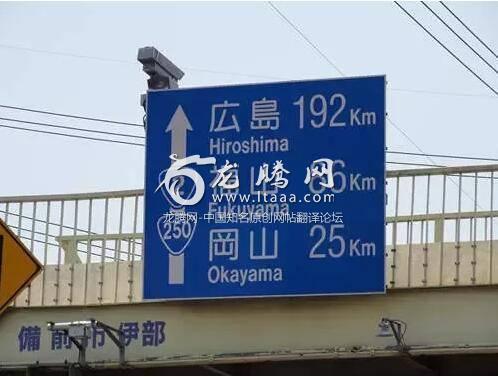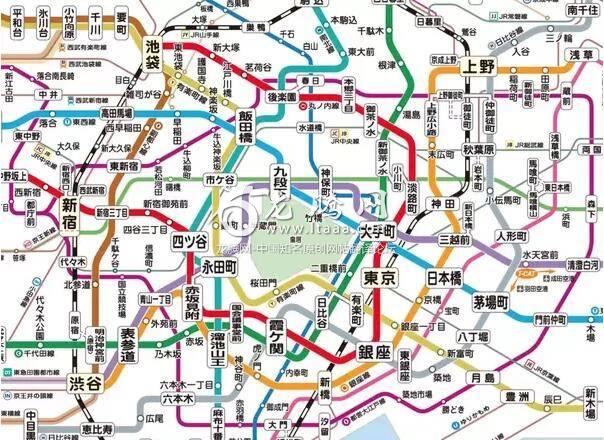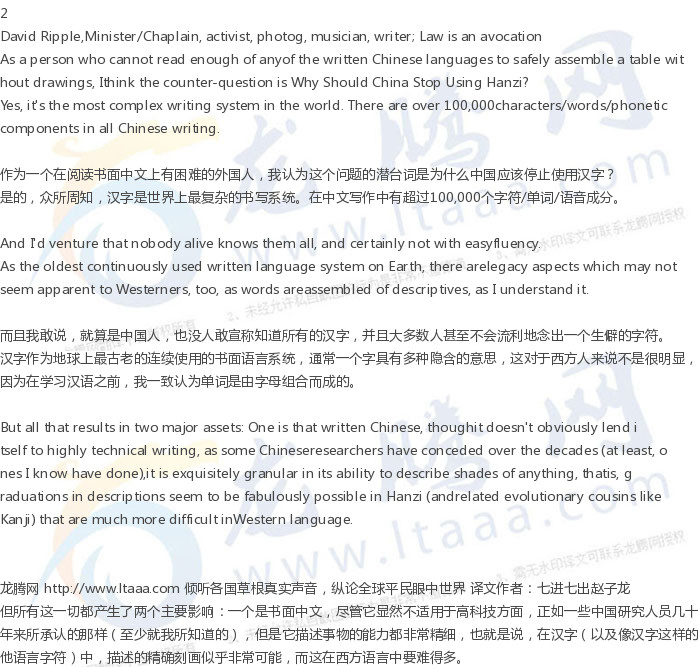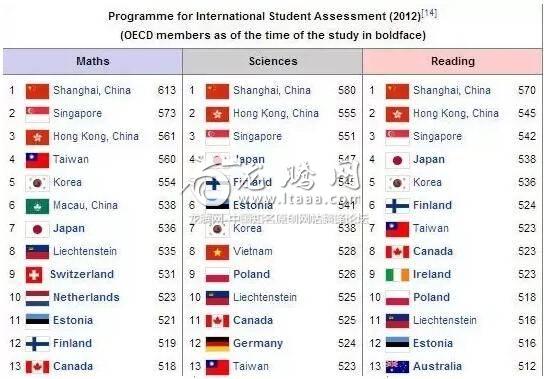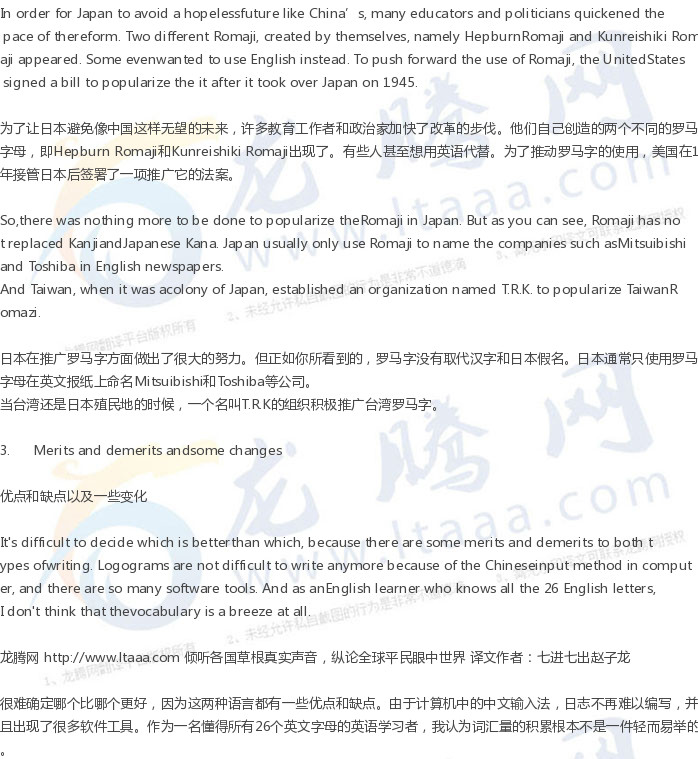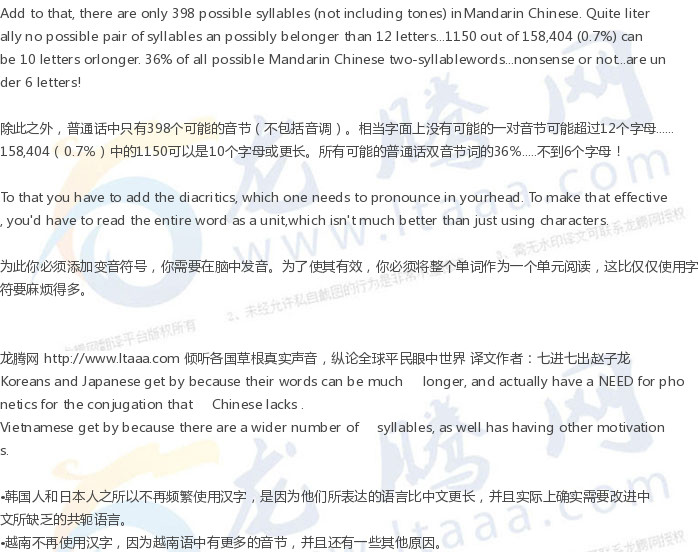外国网友问:汉字那么难,为什么中国不废除汉字? [美国媒体]
quora网友:因为根本不需要。汉字有一些西方人通常不了解的重要优势。象形文字语言,如中文或汉字,在视觉上比语音更加明显,因此平均阅读速度更快。相比之下,像英语这样的语音语言比象形语言更加明显,因此平均听音速度更快......
Why hasn’t China abandoned Hanzi yet ?
外国网友问:汉字那么难,为什么中国不废除汉字?
1
Alston, MS fromNational Central University
Because there’s no need at all.
Hanzi has some important advantages westernpeople usually never understand.
Pictograph language, like Chinese or Hanzi,is visually more distinguishable than phonetic ones, thus has faster readingspeed in average. In contrast, phonetic language, like English, is soundly moredistinguishable than pictograph ones, thus has faster listening speed inaverage.
因为根本不需要。
汉字有一些西方人通常不了解的重要优势。
象形文字语言,如中文或汉字,在视觉上比语音更加明显,因此平均阅读速度更快。相比之下,像英语这样的语音语言比象形语言更加明显,因此平均听音速度更快。
Yeah I know, people who don’t use Chinesewould never know the feeling. Let’s take Japan as an example. Theoretically,Japanese is a phonetic language because all Japanese can be represented withpure phonetic characters, no Hanzi. However, almost in every “reading speedcritical” area, they still use Hanzi. For example:
是的,我知道,不使用中文的人永远不会知道这种感觉。我们以日本为例。从理论上讲,日语是一种语音语言,因为所有日语都可以用纯粹的语音字符表示,没有汉字。然而,几乎在每个“阅读速度至关重要”的领域,他们仍然使用汉字。例如:
Above are road signs in Japan, almost 100%presented in Hanzi.
以上是日本的路标,几乎100%以汉字呈现。
Above is Metro line in Tokyo, guess 95%Hanzi.
If Hanzi is not that useful, why Japankeeps using it for more than 1000 years?
As Korea, they've deceied to back to Hanzi - elementary schools willstart to teach Hanzi in 2019.
As you mentioned, China once tried to moveto alphabet because she didn’t know the reason she lagged behind to the Westwasn’t because of Hanzi. Today, China proved she can built a space stationwithout abandon its root of culture - Hanzi.
以上是东京的地铁线路,汉字所占比例大约为95%。
如果汉字不那么有用,为什么日本一直使用它超过1000年?
至于韩国,他们决定重新启用汉字– 韩国小学将在2019年开始教授学生汉字。
正如你所提到的,中国曾经试图转向字母,因为当时的中国不知道落后于西方的原因并不是因为汉字。今天,中国证明了它可以在不放弃文化根源的情况下在太空中建造起空间站 - 汉字。
Despite the enormity of the written character dictionary, functional literacyfor the average Chinese adult may be achieved with anything over a couplethousand characters. While this seems daunting, compared to a Westernlanguage's couple of dozen or so characters, which much be assembled to createwords, Hanzi provides, after learning the couple thousand characters and theirmeanings and uses, including in compounding, a very rich usable vocabulary ofwhat is likely to be tens of thousands of words.
尽管书面字符系统庞大,但普通中国成年人的实用识字率可达到几千字以上。虽然这看起来令人生畏,但与西方语言的几十个字符相比,汉字提供了大量的文字组合,在学习了几千个字符及其含义和用法(包括复合)之后,就拥有了非常丰富的可用词汇,相当于在英文中可能是成千上万的单词。
Contrast that with spending years to learn the alphabet in use in one'sculture, the basics of how to spell syllables or phonemes, the rules forassembling them, which are damningly complex in English, less so in Romancelanguages, I believe from my own parallel learning.
相比之下,花费数年时间来学习在一种与语言文化中使用的字母表,如何拼写音节或音素的基础知识以及组装它们的规则,在英语中是非常复杂的,在罗曼语言中也简单不了多少,至少根据我自己的学习经验是这样的。
English is one of the most widely used languages on Earth and is preposterouslydifficult to learn as a second language. As Chinese and Tibetan people I'vetutored have often remarked, a lot of how it works "just doesn't makesense." And yet, it is in use worldwide.
英语是地球上使用最广泛的语言之一,并且作为第二语言难以学习。正如我所辅导的中国和西藏人经常说的那样,很多习惯用法“只是没有意义”。然而,它在全球范围内使用。
Chinese is in use by, what, 3 Billion people on a regular if not primarylanguage basis throughout Asia, and is taught as a second or third language inmuch of the world now, since it is becoming a business necessity, despite theprotestations that "educated Chinese speak English.
在整个亚洲,中文正在被30亿人作为主要语言基础使用,并且在世界大部分地区被用作第二语言或第三语言。但由于中国经济的发展,会说中文正在成为一种商业必需,尽管有人提出抗议“受过良好教育的中国人应该说英语。”
I will not study character-written Chinese. Even modern "simplified"Chinese or Japanese or Korean (NK stopped using Chinese characters... a part oftheir Path to Poverty, I suppose) is too much work for someone my age who valueshaving a rich vocabulary in the languages I do use.
我不会学习用汉字写的字。即便是现代的“简化”汉字,日本字或韩国字(北朝鲜停止使用汉字......这是他们之所以贫困的一部分原因,我想)对于我这个年龄的人来说,学习汉字的工作量太大了,我也不会拥有像我一样大的母语者所拥有的丰富的词汇量了。
I can sympathize with FOREIGN students who move to China and must contend witheducation using Hanzi. You are suddenly rendered as a toddler, in a real sense.
For those with means, there are plenty of English language schools (andcompetition among them to impress American, British or Australian English asthe way to speak), as well as others.
我同情那些搬到中国并且必须接受汉字教育的外国学生。因为在真正意义上,你突然变成了一个蹒跚学步的孩子。
对于那些有经济能力的人来说,有很多英语语言学校可以选择(美国,英国或澳大利亚英语口音之间的竞争)。
The nations who have stopped or are stopping widespread use of Hanzi seem to beformer conquered or warring nations who would rather shuck that directinfluence on their cultures. Writing is personal. Mongolia uses both Cyrillicand Roman alphabets now and Indonesians can read SOME Hanzi, but don't use it,at least not the young people. Singapore is all about lovely English, etc.
已经停止或正在停止广泛使用汉字的国家似乎是以前被中国征服或有过战争的国家,他们宁愿放弃汉字对其文化的直接影响。蒙古现在使用西里尔字母和罗马字母,印尼人可以阅读某些汉字,但不使用它,至少年轻人不会使用汉字。新加坡的官方语言是英语等等。
China, however, is invested thousands of years in Hanzi, and it is trulyChinese. I can't see why the CCP would put China through a two-generationperiod of agony to discontinue use of Hanzi.
Chinese people may want to be more like Westerners in many ways, but theydon't, mostly, want to become Westerners.
Few things are closer to the heart of a people or culture than their writtenlanguage.
I would not expect Hanzi to go away... it will continue to evolve, likeall languages do, and will remain truly Chinese.
然而,中国已经在汉字上投资了数千年,它确实是中文。我认为中共不会让中国经历两代人的痛苦改变来停止使用汉字。
中国人可能希望在很多方面更像西方人,但他们大多不想成为西方人。
很少有东西比他们的书面语言-汉字更贴近人们或文化的核心。
我不希望汉字消失.....我希望它将像所有语言一样继续发展,并将继续保持真正的中国化。
3
Lerner Adams, Softwareengineer in IR, NLP and machine learning.
Let me answer your question in three parts.The first, point out the mistake in your question; and the second, tell you a similarexample in the history. Thirdly, brief talk about the merits and demerits, somechanges resulting from technology and costs of an alternative.
让我分三个部分回答你的问题。第一,指出你问题中的错误; 第二,告诉你历史上的一个类似的例子。第三,简要讨论优点和缺点,由技术和替代成本引起的一些变化。
But now I think in this information era,the medium we use to convey the information is not that important. What mattersis who are speaking a certain language.Just as any language ischanging and the trend is determined by the educated usage, the dominantlanguage in this world is also changing by the same token. Centuriesago most educated people should learn Latin, but I think you won’t be surprisedto see such a question today: Is Latin still relevant in today`s world?A question about thethen most popular language which is more similar to English in any way than toChinese.
我认为在现在这个信息时代,我们用来传达信息的媒介并不那么重要,重要的是谁在说这种语言。正如这世界上任何一种语言都正在发生变化,而且趋势是由教育的用法决定的,这个世界中的主导语言也在以同样的方式改变。几个世纪以前,受过大多数教育的人应该学习拉丁语,我认为今天看到这样一个问题时,你不会感到惊讶:拉丁语在今天的世界中仍然具有实用性吗?关于当时最流行的语言的问题,它与英语在任何方面都比中文更相似。
1. Education in China
中国的教育现状
Your statement (for the original question)that the students in China are not outstanding in math, science and etc.compared to students in the West may cannot hold water. Here are the Programmefor International Student Assessment (PISA) 2009 and 2012 ranking lists:
我们的陈述(原始问题)表明,中国学生在数学,科学等方面并不出众,与西方学生相比,并不具有很大的优势。以下是2009年和2012年国际学生评估计划(PISA)排名列表:
PISA is an authoritative studyby Organisation for Economic Co-operation and Development (PISA-OECD) every threeyears. As you can see, areas or countries such as Shanghai, Taiwan and Japanall keep their own traditional ideographic characters which, as you said, leavestudents short-sighted, stunt in ares such as logic and reasoning.
PISA是经济合作与发展组织(PISA -OECD)每三年进行一次的权威性研究。正如你所看到的,上海,台湾和日本等地区或国家都保留着自己的传统表意字符,正如你所说的那样,这些字符会让学生无法看得长远,在逻辑和推理等方面有所欠缺。
2. Let me illustrate thisissue using Japan's efforts
让我用日本的努力来说明这个问题
The tour of Iwakura Embassy in Europelargely broadened the horizon of Japanese, and at the same time, made them torealize that China, the country they once worshiped, was poor andbackward, especially compared to the U.K. and the U.S. Hence its languagewas inferior compared to the phonographic script used in Western countries.They began to research on language reform. What's more, China lost the Jiawuwar in 1894, which completely changed Japan's attitude towards China, andconsequently, Chinese/Kanji.
岩仓驻欧洲大使馆的访问在很大程度上拓宽了日本人的视野,同时让他们意识到中国这个曾经崇拜过的国家贫穷落后,特别是与英国和美国相比。因此他们开始研究语言改革。更重要的是,中国在1894年在甲午战争中失败,彻底改变了日本对中国的态度,从而改变了中国人/汉字。
As for the differences of the thinkingand reasoning, based on different languages, there are tons of studies doneby linguistics saying that the structure of language may determine thestructure of habitual thought in a society, but it doesn't imply that which isinferior and which is superior.
Costs of an alternative
至于思维和推理的差异,基于不同的语言,语言学所做的大量研究表明,语言结构可能决定了社会中习惯性思维的结构,但并不意味着哪个是次等的,哪个更优越。
替代成本
At the very least, let's assume thatthe current logograms used in China is not the "optimal design" fromthe perspective of the theory of evolutionary trend of language. If anything,the transformation from a logographic writing system to a phonetic one, or anyother forms, is very, very costly.
另外,我们假设从语言演化趋势理论的角度来看,中国使用的当前汉字系统并不是“最优设计”。如果要改变的话,从语标书写系统到语音书写系统或任何其他形式的转换是非常非常昂贵的。
First of all,the loss, otherwise, including the transitional culture mayresult in a culture crisis. Last week, I came across two mothers with theirchildren. I learned that they came back from a school of Chinese studies (国学班) for TheBook of Changes (易经), a book written by authors including Confucius thousands of yearsago. They told me that Chinese wisdom becomes more and more important forthem. Secondly, because of the serious imbalance ofeconomic and educational development in that vast land, such a bigchange may get pretty hairy. It's a totally different situation in South Korea.By way of example, Chairman Mao is the only figure on almost all Chinese papercurrency. Rather than a political concern, it's an education/literacy matter.Many people from remote places know only Chairman Mao, and some even stilldon't know who the current Chairman is. The larger and more diverse the countryis, the harder and more costly the change will be. Last, but not least, economically,the investment for foreign language learning has been very large, and stoppingthe use of Hanzi requires a large amont of investment, which directly orindirectly goes into the pocket of Western countries. Normally, as I know, thepopularity of a language is positively correlated to the impact in the world,or essencially the economy of the countries speaking it. China has become thesecond largest economy power in the world and has beening expanding Chinese inthe world in the form of openning and running Confucius Institutes.
首先,损失,废除汉字致文化危机。上周,我遇到了两位和他们孩子在一起的母亲。我了解到,他们在一个研究易经的国学班上课,这是一本几千年前由孔子等作家撰写的一本书。他们告诉我,中国的智慧对他们来说变得越来越重要。其次,由于中国拥有广阔的土地,且经济和教育发展不均衡,废除汉字的巨大变化可能会非常棘手。这在韩国是完全不同的情况。举例来说,毛主席几乎是所有中国纸币上的唯一人物。这不是政治问题,而是教育/识字问题。这个国家越大越多样化,变化就越难,成本越高。最后,在经济上,对外语学习的投入非常大,停止使用汉字需要大量的投资,这笔开支将直接或间接地进入西方国家的口袋。通常情况下,正如我所知,语言的流行度与世界的影响正相关,或者说是与相关的国家经济有关。中国已成为世界第二大经济大国,并以开放和经营孔子学院的形式在世界范围内拓展中国的汉字及文化影响力。
I learned that there are some technicalreasons Hanja disappeared in Korean but some 3000 Kanji still remain inJapanese.
Chinese will be changing, just like anyother languages; more specifically it will be more and more symbolized, but itwill never be abandoned, at least when there are still Chinese in this planetwho are proud and confident.
汉字在韩语中消失了由于一些技术原因,但在日语中仍然有大约3000汉字遗留下来。
中文将会像其他语言一样发生变化; 更具体地说,它将会越来越具有象征意义,但它永远不会被抛弃,至少在这个星球上仍有中国人为它感到自豪和自信的时候。
4
Mark Gelomilotos,works at KIXEYE
There is evidence that the Chinese triedswitching over to phonetics off an on as early as the Han dynasty, and theypretty much all failed.
有证据表明,中国人早在周朝、汉朝时就曾试图转而使用语音代替汉字,而他们几乎全都失败了。为什么都失败了?
Answer is actually pretty simple, and two fold:
1) The written language is designed for conveyance of ideas between a smallsubset of people (scribes, etc.), as opposed to convenient mass usage. It's notin the interest of that subset to make it easy to read/write. That lasted a fewthousand years.
答案其实很简单,有两个:
1)书面语言是为了在一小部分人(文士等)之间传递思想而设计的,而不是方便的大规模使用。使它易于读/写不符合该集体的利益。这种情况持续了几千年。
2) Even when standardized Mandarin started to become widely used, themono/disyllabic nature of the language makes reading it difficult...just lookslike nonsense, while the characters often contain meaning easily recognized(especially the "radical/phonetic" forms, which give you a hint whenthe character as a whole doesn't look familiar).
2)即使标准化的普通话开始被广泛使用,语言的单/双音节性质使得阅读依然很困难......看起来像废话,而字符通常包含易于识别的含义(尤其是“偏旁/认识的字符”形式,当整个汉字看起来不熟悉时会给你一个提示。
Also, please feel free to say "Chinesecharacters". We only say "Kanji" because Japanese has threewriting systems.
另外,请随意用“中文字符”来表达“汉字”。我们之所以用“Kanji”,是因为在日语有三种书写方式。
版权声明
我们致力于传递世界各地老百姓最真实、最直接、最详尽的对中国的看法
【版权与免责声明】如发现内容存在版权问题,烦请提供相关信息发邮件,
我们将及时沟通与处理。本站内容除非来源注明五毛网,否则均为网友转载,涉及言论、版权与本站无关。
本文仅代表作者观点,不代表本站立场。
本文来自网络,如有侵权及时联系本网站。
图文文章RECOMMEND
热门文章HOT NEWS
-
1
Why do most people who have a positive view of China have been to ...
- 2
- 3
- 4
- 5
- 6
- 7
- 8
- 9
- 10
推荐文章HOT NEWS
-
1
Why do most people who have a positive view of China have been to ...
- 2
- 3
- 4
- 5
- 6
- 7
- 8
- 9
- 10
